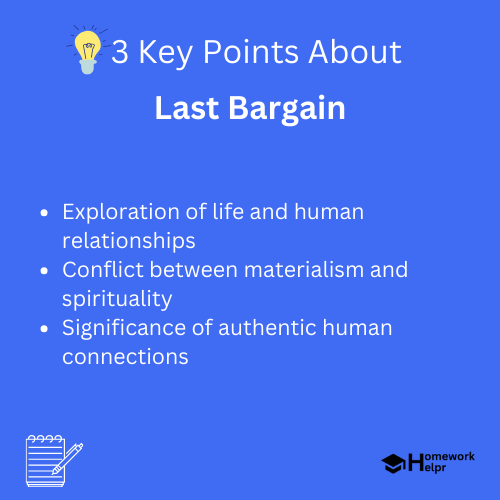📝 Summary
The poem The Last Bargain by Nissim Ezekiel explores life, human relationships, and the search for meaning. Through encounters with a king offering wealth, a beauty representing fleeting love, and an old man symbolizing wisdom, the speaker’s journey reveals that true fulfillment lies in authentic connections. Ultimately, the poem highlights the conflict between materialism and spirituality, making a case for the significance of genuine human bonds over transient desires. The conclusion resonates with the idea of re-evaluating one’s values.
The Last Bargain: A Poignant Poem by Nissim Ezekiel
The poem The Last Bargain by Nissim Ezekiel is a profound poetic exploration of the themes of life, human relationships, and the quest for meaning
. This article will delve into the central themes, poetic devices, structure, and the overall message of the poem, providing a comprehensive analysis for students and children.About the Poet
Nissim Ezekiel was a renowned Indian poet of Jewish descent, known for his sharp wit, philosophical inquiries, and mastery of the English language. Born in 1924 in Mumbai, he became an important voice in modern Indian poetry in English. His works often reflect the complexities of urban life and individual existential struggles.
Summary of the Poem
The Last Bargain unfolds a narrative where the speaker engages in a series of encounters with different individuals—each representing various facets of human desires and aspirations. The speaker initially seeks a bargain with a king who offers wealth, but the allure of riches fails to satisfy his spirit. Next, he meets a beauty who tantalizes him with love but ultimately disappears, leaving him empty. Finally, an old man appears, offering only a humble handshake, which becomes the ultimate bargain the speaker desires.

Thematic Elements
Several key themes resonate throughout the poem. Let’s explore some of them:
- Search for Meaning: The journey represents the human quest for purpose and fulfillment in life. The speaker‚’ experiences lead him to redefine what truly matters.
- Materialism vs. Spirituality: The poem explores the conflict between material desires and spiritual needs, ultimately showing that material wealth does not guarantee happiness.
- Transience of Love: The beauty fades quickly, reflecting how physical attraction may not last and often leads to disappointment.
Poetic Devices
Ezekiel makes effective use of various poetic devices to enhance the depth of the poem. These include:
- Imagery: Vivid descriptions create mental pictures that paint the emotional landscape of the speaker‚’ journey.
- Symbolism: Each character symbolizes different aspects of life‚Äîwealth, love, and the wisdom of age‚Äîwhich contribute to the speaker’s understanding of what constitutes a ‘bargain.’
- Repetition: The refrain “The last bargain” serves to underline the significance of the speaker’s ultimate realization.
❓Did You Know?
The use of the word “bargain” is symbolic in many cultures, often representing not just a negotiated agreement but a deep inquiry into values and choices in life.
Structure and Form
The Last Bargain is structured in a free verse form, which allows fluidity and spontaneity in expression. This choice reflects the unpredictable nature of the speaker’s journey through life. The absence of a fixed rhyme scheme or meter enables the poet to explore diverse emotional tones and reinforces the poem’s philosophical undertones.
Character Analysis
Let‚’ examine the primary characters encountered in the poem more closely:
- The King: Represents material wealth and power. His reluctance to engage in genuine connection shows the emptiness of his riches.
- The Beauty: Embodies love and desire, yet her superficial charm reveals the impermanence of physical attraction.
- The Old Man: Symbolizes wisdom and simplicity; his offer of a handshake represents genuine human connection and understanding.
Examples
For instance, when the speaker initially meets the king and refuses his offer, he symbolizes a shift from valuing material wealth to seeking inner peace.
Exploring the Central Message
The concluding lines of the poem deliver a powerful message about the essence of human relationships. The ultimate bargain made with the old man signifies a return to simplicity and the recognition that true happiness comes from authentic connections rather than transient possessions or superficial affections.
Definition
Existential: Pertaining to existence; often refers to philosophical inquiries about the nature of being and purpose in the universe. Transience: The quality of being temporary; the short-lived nature of certain experiences, especially feelings and possessions.
Conclusion
In conclusion, Nissim Ezekiel’s The Last Bargain provides valuable insights into humanity’s quest for meaning amidst the complexities of life. Through a series of interactions with significant characters, the poem encourages readers to reflect on their values and consider what they truly seek in their lives‚Äîfar beyond mere materialism or transient love.
As students and young readers, engaging with such poetry fosters critical thinking and invites you to navigate the intricacies of your own experiences and relationships.
Related Questions on Last Bargain
What is the main theme of The Last Bargain?
Answer: The search for meaning and relationships.
Who are the characters in the poem?
Answer: The king, the beauty, and the old man.
What does the old man’s handshake symbolize?
Answer: Genuine human connection and wisdom.
How does the structure of the poem affect its meaning?
Answer: It reflects the unpredictability of life‚’ journey.
